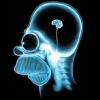If a drug introduces major benefits, e.g. neurogenesis, or a new method to target depression, chances for its approval are much higher than if its just the next SSRI.
Just take a look at Mannkind with their inhalable insulin. Even though the FDA-committee was skeptic about a lot of its risks, it got approved. Can you imagine how much more comfortable it is to inhale instead of injecting your insulin day in day out? Can you imagine how much more highly they'd value an antidepressant that actually does work after discontinuation, which don't have to take for years on end?
So if NSI shows the same properties it has already shown in Phase 1 on a larger sample size I'd wager its odd are pretty good. Why isn't there a 76-page thread on the next SSRI on longecity? It's about potential.
Then again why didn't Neuralstem mention MRIs and hippocampal volume? Either NSI doesn't increase hippocampal volume in humans, or they do not want to share such a finding just yet, or the neurogenesis could only be shown in another way?
If NSI does not work via neurogenesis, how else does it work? (Assuming this thread and the Phase 1 results are convincing)
Does it share some properties with cocaine or ketamine? People have reported increased self-confidence, libido, aggression, and from what friends tell me, those same effects can last for months, after having cocaine.
In my personal experience NSI definitely has some light stimulant properties, which may explain the quick onset of its effects, though I do also believe it helps cognition. Some days I literally wake up and feel a tad smarter. Maybe placebo, maybe increased self-confidence, maybe neurogenesis.
Edited by idontknow, 04 July 2014 - 09:56 AM.



























































